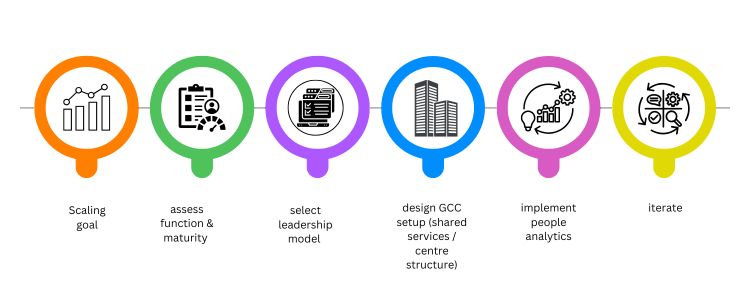
Global Capability Centres (GCCs) no longer focus on cost-arbitrage back offices but rather strategic innovation hubs. India is already home to about 1,900+ GCCs, which results in a highly concentrated talent and scale ecosystem. According to IBEF, the India GCC market is currently estimated at approximately USD 64 billion (2025), with forecasts to surpass USD 100 billion by 2030, a clear indicator of vibrant commercialisation and investment momentum. The present blog summarises leadership frameworks that can consistently scale high-performance GCC teams and demonstrates the financial benefits of disciplined GCC setup models & shared services setup, and provides an implementation-focused, crisp perspective on GCC consulting services and Global Capability Centres consulting engagements.
GCC scales increase complexity, multi-function delivery and global stakeholder alignment, and maintain a digital scarcity of digital skills. GCCs already deliver a substantial amount of employment and exports; companies that combine the appropriate leadership model with data and structure deliver faster time-to-value and improve innovation throughput.
More leaders will integrate AI-supported management dashboards with human-centred leadership. GCCs will turn into leadership development laboratories, rotating top talent into India centres to speed up capability building of parent organisations. Active data-driven leadership and hybrid governance will become a differentiator between high performers and others.
In the case of MNCs setting up Global Capability Centres or a shared services setup, leadership design is just as vital as location and cost. Select a leadership model that fits function, size, and strategic intent; combine it with people analytics and a planned roadmap of GCC consulting services to grow predictably and sustainably.
When you are assessing GCC setup models or require a specific GCC consulting services blueprint, contact Inductus GCC to chart leadership fit, cost benefit and implementation milestones.
A GDC refers to a single-minded offshore deployment, which provides proficient business, technology and operational services to corporate bodies on a global basis. BFSI, IT services, healthcare, telecom, retail, manufacturing, and other upcoming technologies, including AI and blockchain. They do not only target cost savings but now aim at innovation, automation, R&D, digital transformation, and high-value consulting. They design and create cloud, artificial intelligence, analytics, cloud security, and process automation. A large supply of STEM graduates, multilingual workers and niche skills in AI, ML, cloud, and analytics. Aditi, with a strong background in forensic science and biotechnology, brings an innovative scientific perspective to her work. Her expertise spans research, analytics, and strategic advisory in consulting and GCC environments. She has published numerous research papers and articles. A versatile writer in both technical and creative domains, Aditi excels at translating complex subjects into compelling insights. Which she aligns seamlessly with consulting, advisory domain, and GCC operations. Her ability to bridge science, business, and storytelling positions her as a strategic thinker who can drive data-informed decision-making.
Why Leadership Matters Now
Five Models of Leadership That Scale GCCs
Result: Fewer bottlenecks, shorter product cycles.
Result: Speed to market and ongoing improvement.
Result: Better retention and discretionary effort.
Result: International governance + localisation of customers.
Result: Scaling that is predictable with fewer surprises.Models vs. Scaling Impact
Leadership Model
Best Fit (GCC setup models)
Key KPI Impact
Role in Shared Services Setup
Distributed
Product & Tech GCCs
Cycle time ↓
Local SLA ownership
Agile
Digital transformation GCCs
Time-to-market ↓
Sprint-aligned shared services
Servant
Talent-intensive GCCs
Attrition ↓
Employee experience focus
Hybrid
Multinational GCCs
Alignment ↑
Local compliance + global ops
Data-Driven
Large scale (>5000 FTE)
Predictability ↑
Capacity planning, forecasting

Economic Benefits & New Knowledge.
How GCC consulting Services Should Advise Clients
Future View
Conclusion
frequently asked questions (FAQs)

Aditi
Hey, like this? Why not share it with a buddy?
Related Posts
Recent Blog / Post
- The Role of GCCs in Accelerating Corporate R&D and IP Creation November 4, 2025
- Navigating Geopolitical Risks: A Guide for GCC Leaders November 4, 2025
- Why Mid-Sized Companies are Embracing the GCC Model October 16, 2025
- What Is A Global Capability Center (GCC), and Why Is It Essential For Modern Business? October 16, 2025
- Gurugram’s Tech Ascent: Decoding the New Haryana GCC Policy October 15, 2025
- Scaling Your Tech Team: A Beginner’s Look at the Offshore Development Center October 15, 2025
- Agile Methodologies for GCCs: A Blueprint for Success October 6, 2025
- The Legal and Compliance Checklist for a New GCC Setup October 4, 2025
- The Rise of Niche GCCs: A Focus on Specialised Capabilities October 4, 2025
- The Impact of Regulatory Changes on GCC Operations October 4, 2025
- Cybersecurity for GCCs: A Proactive Approach to Data Protection September 30, 2025
- Beyond Cost: Measuring the True ROI of Your GCC Investment September 29, 2025
- The Future of GCCs in the Retail Sector: A Strategic Playbook September 29, 2025
- David vs Goliath: Mid-Sized GCCs Quietly Outperform the Big Brands September 29, 2025
- Infineon’s Big Bet on India: Inside Its First GCC in GIFT City September 29, 2025
















